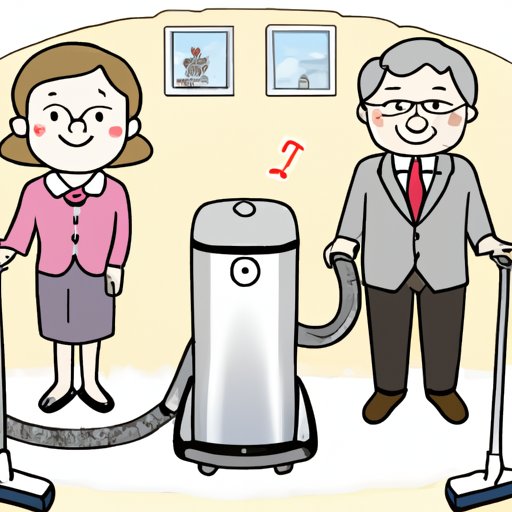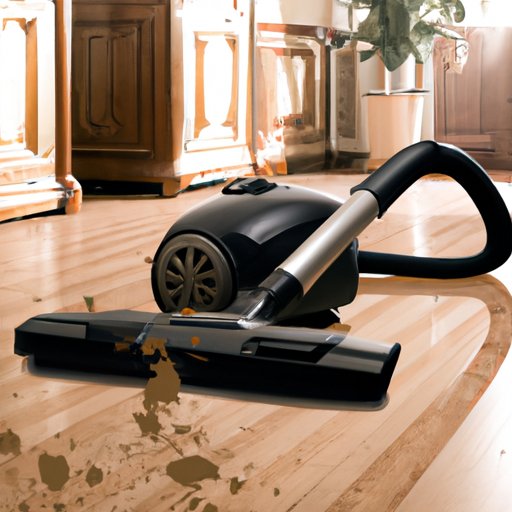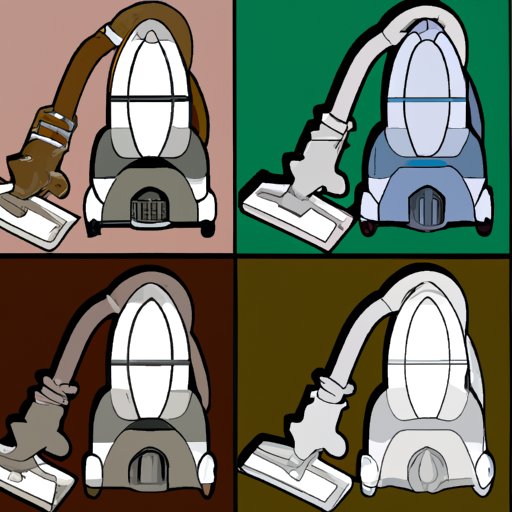Introduction
The vacuum cleaner is an essential home appliance used for cleaning carpets, floors, and furniture. It is a device that uses suction to remove dust, dirt, and debris from a variety of surfaces. The invention of the vacuum cleaner revolutionized the way people clean their homes, making it easier and more efficient than ever before. But when was the vacuum cleaner invented?
A Historical Look at the Invention of the Vacuum Cleaner
It is widely accepted that the first patent for a vacuum cleaner was filed by Daniel Hess in 1860. Hess was a blacksmith who had developed a machine that used bellows to create suction. His invention was designed to be used with a hand-held brush to clean carpets. However, this early version of the vacuum cleaner was not very effective and did not catch on with consumers.
In 1901, British inventor Hubert Cecil Booth patented the first motorized vacuum cleaner. His design used a gasoline engine to power a fan, which created suction to pull dirt and dust into a bag. Booth’s invention was a major step forward in the development of the vacuum cleaner, as it made the process of cleaning much easier and more efficient.
In 1907, American janitor James Murray Spangler improved upon Booth’s design by creating a motorized vacuum cleaner that used an electric motor. He also added a rotating brush to help agitate the carpet and loosen dirt. This design became the basis for modern vacuum cleaners and is still used today.
The Technology Behind the Invention of the Vacuum Cleaner
As technology advanced, so did the capabilities of the vacuum cleaner. Motorized vacuums became more powerful, allowing them to clean deeper and more effectively. Design changes, such as adding wheels and a handle, improved maneuverability and made the machines easier to use. New technologies, such as cyclonic separation and HEPA filters, were also introduced to improve performance and reduce allergens in the air.

Inventors Who Pioneered the Vacuum Cleaner
The invention of the vacuum cleaner was a result of many inventors working together to develop a better way to clean. Daniel Hess, Hubert Cecil Booth, and James Murray Spangler are credited with pioneering the technology that led to the modern vacuum cleaner. Hess’s bellows-powered machine was the first attempt at creating a device that could be used to clean carpets. Booth’s motorized vacuum was the first to use a gasoline engine and was a major step forward in the development of the vacuum cleaner. Finally, Spangler’s improvements to Booth’s design, such as the addition of an electric motor and a rotating brush, made the vacuum cleaner a practical and effective tool for cleaning.

How the Vacuum Cleaner Changed the Cleaning Industry
The invention of the vacuum cleaner had a profound impact on the cleaning industry. Prior to the invention of the vacuum cleaner, cleaning carpets and other surfaces was a laborious and time-consuming task. The introduction of the vacuum cleaner drastically increased the efficiency of the cleaning process, allowing people to clean larger areas in a shorter amount of time. Additionally, the use of the vacuum cleaner resulted in improved air quality by reducing the amount of dust and allergens in the air. Finally, vacuum cleaners are relatively inexpensive and require minimal maintenance, resulting in cost savings for consumers.

The Impact of the Vacuum Cleaner on Society
The invention of the vacuum cleaner has had a positive effect on society. The increased efficiency of cleaning has improved the quality of life for many people, as they no longer have to spend hours cleaning their homes. Additionally, the availability of vacuum cleaners has made cleaning more accessible to those who may not have had the time or resources to clean their homes in the past. Finally, the vacuum cleaner has become a socially acceptable tool, with many people using it as part of their daily routine.
The Growth of Vacuum Cleaner Technology Over Time
Over the years, the technology behind vacuum cleaners has advanced significantly. Automated vacuums, such as robotic vacuums, are now available and can be programmed to clean on their own. Cordless models offer greater freedom of movement, while specialized attachments allow vacuum cleaners to be used for a variety of tasks. These advances in technology have made the vacuum cleaner even more useful and efficient.

An Analysis of When the Vacuum Cleaner Was First Invented
The earliest patent for a vacuum cleaner was filed by Daniel Hess in 1860. However, it wasn’t until 1901, when Hubert Cecil Booth patented the first motorized vacuum cleaner, that the technology behind the vacuum cleaner began to develop. James Murray Spangler’s improvements to Booth’s design, such as the addition of an electric motor and a rotating brush, made the vacuum cleaner a practical and effective tool for cleaning. Since then, the technology behind the vacuum cleaner has continued to evolve, leading to the modern automated models of today.
Conclusion
The invention of the vacuum cleaner has had a huge impact on society. It has revolutionized the way people clean their homes, making it faster, easier, and more efficient than ever before. The technology behind the vacuum cleaner has also continued to advance over the years, with new models offering increased performance and convenience. While the exact date of the invention of the vacuum cleaner is unknown, it is clear that the invention of the vacuum cleaner has had a lasting impact on the cleaning industry and society as a whole.
(Note: Is this article not meeting your expectations? Do you have knowledge or insights to share? Unlock new opportunities and expand your reach by joining our authors team. Click Registration to join us and share your expertise with our readers.)
